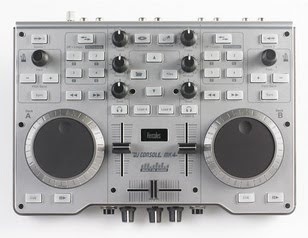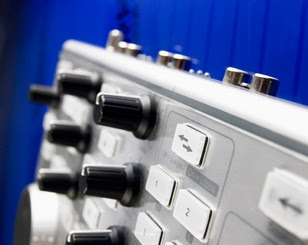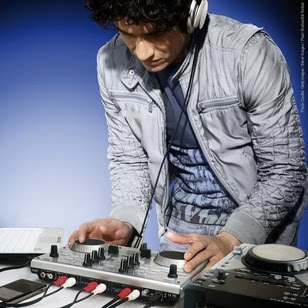







Hercules DJ Console Mk4
Description
The all-in-one DJ station you can carry on your shoulder.
All-in-one mixing station for mobile computer DJs:
- 2-deck controller to mix digital audio tracks
- 2 stereo outputs to play the mix for the audience and preview next track
- 2 stereo inputs to include turntables, MP3 or CD players in your mix
- Built for mobile DJing: compact, light, with transport cover & shoulder strap
2-deck controller:
Mix 2 music tracks with DJ Console Mk4’s controls:
- 2 jog wheels to navigate within tracks
- 1 cross fader and 2 volume faders to mix 2 tracks
- 2 pitch encoders (knobs) to change the speed of the music
- 6 EQ potentiometers
User-friendly features:
- The DJ software suggests a cue point in the audio file analysis
- Synchronize tracks using pitch encoders and/or sync buttons
- Automatic loops on 1, 2, 4 or 8 beats
- Add effects to customize your music
- Record your mixes as audio files
- Customize your console by placing the graphic skin (included) underneath the see-through plate on top of the controller.
Technical specifications
Built-in audio
2 stereo outputs
2 types of plug per output:
Mix output (channels 1-2)
- 2 RCA for hi-fi & mixers
- 1 stereo 1/8" jack (3.5mm) for multimedia speakers
Preview output (channels 3-4)
- 1/4" jack (6.35mm) for headphones
- 2 RCA for speakers
1 microphone input
- 1/4" jack plug with volume knob to talk over the music
2 stereo inputs
- 2 x 2 RCA inputs, to include external sources in your mix
- Inputs compatible with:
- phono (turntables)
- consumer line (-10dBv) (for MP3 players, etc.)
- pro line (+4dBu) (for studio gear & CD players)
- boosted line (+8dBu) (for Pioneer CDJ players)
Built for mobility
- Compact (10.5 x 7.3 x 2.5")
- Lightweight (2.56 lb/1.15kg)
- Transport cover & shoulder strap included
Included DJ mix software
VirtualDJ® DJC Edition
- For Windows® XP/Vista/7
- For Mac OS® 10.5/10.6
Specifications
Controls for DJing:
- 2 jog wheels, 3 faders, 11 knobs
-36 transport buttons
Audio for DJing:
- 4-channel in / 4-channel out
- Microphone input for talk-over
- Headphone jack for previewing tracks
- Phono preamplifiers on the audio inputs
Drivers
- ASIO & WDM for Windows®
- Core Audio for Mac OS®
- MIDI control: Windows & Mac
Box contents
DJ Console Mk4
VirtualDJ® DJC edition
User manual
Minimum configuration
PC minimum requirements
Windows® XP/Vista/7 32-bit/64-bit
1.5GHz CPU or higher
1GB RAM or more
USB port (USB bus-powered)
Stereo speakers and/or headphones
Mac minimum requirements
Mac OS® 10.5/10.6
1.5GHz CPU or higher
1GB RAM or more
USB port (USB bus-powered)
Stereo speakers and/or headphones
Technology
Equalization / EQ
Equalization is the adjustment of sound split up into frequency bands, often in the form of bass, medium and treble frequencies. Equalization consists of increasing or decreasing the volume of a frequency range: for example, increasing bass (frequencies from 20Hz to 150Hz) by 12dB and decreasing treble and mediums by -12dB. Equalization helps to make music more danceable: as bass frequencies provide the main rhythm, increasing the bass can make dancing easier. Equalization can also help to mix 2 pieces of music: by cutting the bass from track A to mix it with track B (where the mediums and treble have been cut), a hybrid of the rhythm of track B is superimposed over the melody of track A. A piece’s tonality is affected by the equalization adjustment.
Monitoring
For a DJ, monitoring consists of listening to another piece of music other than the one being played for the audience: normally, a DJ listens to the next piece of music to be played.
Phono input
Record players have long had an output level much lower than line level (line level is the output level of most sound playback devices: CD player, MP3 player, TV tuner or radio): this output level for record players, referred to as phono level, requires a specific pre-amplification. The most popular vinyl DJing turntables, such as the mythical Technics SL 1200 MK2, still provide a phono level output, even though many vinyl turntables now output a line level audio signal. A phono connector can be recognized not only because it has "Phono" written above it, but also because of the fact that a grounding cable is added to the stereo phono outputs: as phono level is lower than line level, a grounding cable is required to protect it from electrical disturbances. A phono input is sometimes referred to as an RIAA input. The DJ Console MK2 has two stereo phono inputs.

No comments:
Post a Comment